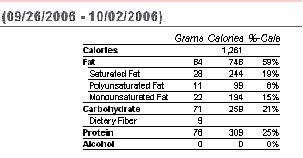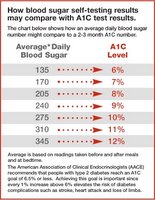I've read a lot of posts on forums and message boards, and I've read a lot of blogs, and I've read a lot of articles about low carb, high protein and/or high fat diets. Isn't it amazing how many people have a strong opinion about something that they know little or nothing about?
One forum I'm on, a diet site that is extremely pro low fat, I posted the results of a
study done that shows that people with a higher protein intake have smaller waists. A fellow poster called this an "urban legend". Huh? The results of a study....a study done on almost 45,000 people...a study that has been published in the world’s most prestigious nutritional journal...THIS is an "urban legend"??
On another forum, someone posted a question of whether low carb diets are good for you. Again, this is an extremely pro low fat diet site. Various comments include:
--"eating low carb is not good for u."
(ok...opinion stated as fact, nothing more)--"i have never done a low carb diet, but my theory is that if you go on a diet that you are not happy with you wont keep the weight of."
(and obviously no one can be happy eating low carb, right?)--"I agree with the previous poster. If you feel you cannot stick to a food plan for the rest of your life, it's not a good one to be following. You need carbs for brain function and to fuel your activities."
(the human body, a most amazing thing, is fully capable, given enough protein, of "creating" all the glucose you need)--"i don't eat red meat at all, i don't eat butter at all, i only eat olive oil (1 teaspoon for salad), i only eat chicken or fish , i eat every fruit possible and any veggie except potatoes cause i hate them! i eat cheese, yogurt and milk and only egg whites"
(this poster later admits she's a former vegetarian....and few vegetarians are big on low carb)--"I've never done the Atkins because I get so concerned about fat and cholesterol."
(well, until the medical/pharmaceutical Industry stops brain washing people into believing fat is bad, cholesterol is bad, etc there's not much you can do with a comment like this)--"First of all, the brain and other body systems NEED carbs to function properly."
(like I already said, the body is capable of metabolising protein to provide all the blood glucose you need....besides, low carb doesn't mean NO carb!)So many people voicing opinions as fact. So many people stating "facts" that are just incorrect. So many people who don't have a clue about what their bodies need!!!
Our bodies need 2 things, other than air and water, and the 2 things we need are protein and fat. There are "essential amino acids" that are required and can only be taken in as food, we cannot manufacture them without protein. And there are "essential fatty acids", which are required for various body functions. However, there are NO essential carbohydrates!!!!
Fats are needed for various things:
1. Without fat you can't absorb certain vitamins.
2. Fat is an integral part of virtually every cell membranes.....in fact, saturated fats make up about 50% of the membrane!
3. Fat can be converted to glucose by the liver
4. Fats are required, again specifically saturated fats, to properly use calcium and incorporate it into the bone structure.
5. Fats are required for proper function of the immune system and in fighting infections.
5. Fats are required for formation of stress hormones and reproductive hormones, and growth hormones.
Now for a word of caution about vegetable fats. Vegetable fats are very high in Omega 6 polyunsaturated oils. Too high an intake in Omega-6 can lead to a disruption in the production of prostaglandins, which can lead to an increased tendency to form blood clots, inflammation, high BP, irritation of the digestive tract, depressed immune function, sterility, cancer and weight gain.
It's best to stick with saturated fats and mono saturated fats. Monosaturates come from nuts and olives. Corn, soy, canola, and other vegetable oils contain mainly polyunsaturates and should be avoided due to their high Omega-6 content.
Trans-fats, artificially hydrogenated unsaturated fats, should be avoided at all costs. More on this in a later post.
Protein is also essential for good health:
1. Proteins are essential for healthy muscles
2. Protein is essential for healthy strong bones
3. Protein is required by virtually every cell in the body and is essential for proper function and replacement of cells.
4. A healthy nervous system is dependent on protein.
5. Protein helps move energy into cells.
6. Protein is required by many cell components, which have to bind with protein to be used or transported.
7. Protein is essential in the creation of many enzymes in the body, which are required for many cell functions, including DNA repair and replication and RNA sysnthesis.
Now, for Low carb diets. I am NO expert on low carb diets, but they all pretty much limit carbs and replace them with either protein or fat, or both.
I'm sure there's at least one out there, but every low carb diet I have read about encourages intake of veggies and some fruits. Yes, they also more or less encourage fat and protein intake, but they also encourage home cooking and avoiding processed foods and "fake" foods.
FAQ about low carb diets:
Can you stick with a low carb lifestyle for many years? Certainly, many people do. Check out some of the blogs out there! Some have lost hundreds of pounds and have been following a low carb lifestyle for 5, 10, 20 years and some even longer!
Is low carb safe? Of course it is. It's the diet we evolved on. Science shows that when we started eating meat is when our brains grew and developed. Even today many tribes follow a low-carb diet and not only do they survive on it, they thrive on it!!
Doesn't eating so much protein put a "strain" on your liver and kidneys? Nope. Our liver's job, in part, is producing the correct chemicals (bile salts) needed to digest meat. And for those of us with healthy kidneys, there is no problem with a high protein intake.
But what about ketones? Don't they cause ketoacidosis? Nope. Benign dietary ketosis is simply a result of burnign fat. We use carbs before fat, so with low carb you burn fat faster, so therefore have more ketones. Ketoacidosis, on the other hand, is a potentially fatal condition that results from high blood sugar. With diabetics, the body essentially gets confused with too much sugar in the blood and not enough insulin. Because a diabetic can't handle the blood sugar, the body thinks it's starving and begins to break down fat for energy. This leads to a high level of ketones, along with high blood sugar, and can result in coma and even death if not treated.
Isn't the high fat content of many low carb diets a danger for heart disease? fatty liver? metabolic syndrome? diabetes? Once again, the answer is no. Heart disease seems more and more to be the result of inflammation, and/or oxidized LDL. Fatty liver is actually caused by too high a carb intake, as is metabolic syndrome and diabetes (Type 2).
Does low carb really result in faster weight loss? For many of us yes, but I'm sure not for all. To me the biggest plus in dieting with low carb is that you stop having cravings and at the same time eat foods that fill you up faster and stick with you longer than even unrefined, high fiber carbs.
But don't we need carbohydrates? No, we have no "need" for carbohydrates, but we do need to have glucose. Our bodies can and do use ketones for energy, but some organs do require glucose. If there are adequate calories, fat and protein the body can and does "manufacture" all the glucose we need. We don't NEED carbs, but we do need glucose.....isn't it amazing that our bodies can produce all that we need as long as we get enough good food?
OK....so what's the downside of low carb diets? Well, for many the initial withdrawal can be horrendous. In fact, many call it the "low carb flu". This will pass, however, if you stick with the plan and keep your carb intake low. There is also a "side effect" of bad breath....specifically "ketone breath". And yes, this can be quite nasty. There are times that I feel like I haven't brushed my teeth in days!!! But, increasing your fluid intake (always a good thing) can help with this. Many find that this goes away after being on plan for a while, probably because of an increase in carb intake.
Low carb diets can also lower your blood pressure, so some may have to monitor it, especially if they take blood pressure medication. Low carb can (and does) also lower clood sugar, so again, if on medication it will have to be monitored.
Additionally, some people complain about constipation, but if you get enough fluids and fiber, this shouldn't be a problem. Many of the low carb diets recomend supplementing with additional fiber, but personally, I've never found a need to supplement.
Some people also might see a transient rise in the blood cholesterol levels, but this is not usually a problem. For one thing, saturated fats increase your HDL cholesterol, which most feel are beneficial, and secondly the rise in LDL cholesterol, if seen, is often a rise in the big, fluffy kind of LDL, which is not considered dangerous. Evidence also shows that levels normalize within a year or so. (of course, there is no real evidence that high cholesterol causes heart disease, but that's another subject) The other thing about low carb diets, which some feel is the most important, is that blood triglyceride levels usually fall dramatically, and most feel that high triglycerides are a major contributor to heart disease.
So, if you're interested, give low carb a try. BUT, it it very important for you to read a book or two about the plan you pick prior to starting on it. Personally I usually recomend Atkins (
Dr Atkins New Diet Revolution or DANDR) or
Protein Power Life Plan (PPLP). Both DANDR and PPLP encourage natural foods over artificial and processed foods. Both also note that exercise is VITAL for properly following a low carb lifestyle.
If you can't afford to buy a book, or not sure of what plan will suit you, I have 2 recomendations. Forst, go to your local library and see what they have. Second, check out the
ActiveLowCarber Forum for a synopsis of the various low carb plans. Once you decide which plan sounds like you can work with, try it for 2 weeks. And give it your all.....for just 14 days. Remember you might feel horrible the first few days, but stick it out. If, after 14 days you don't feel better, them maybe low carb isn't for you.



























































